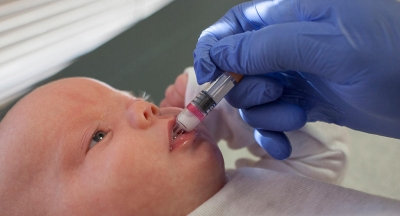
Rotavirus spreads easily among infants and young children. The virus can cause severe watery diarrhea, vomiting, fever, and abdominal pain. Children who get rotavirus disease can become dehydrated and may need to be hospitalized.
Good hygiene like handwashing and cleanliness are important, but are not enough to control the spread of the disease. Rotavirus vaccine is the best way to protect your child against rotavirus disease. Most children (about 9 out of 10) who get the vaccine will be protected from severe rotavirus disease. About 7 out of 10 children will be protected from rotavirus disease of any severity.
Treatment will depend on your child’s symptoms, age, and general health. It will also depend on how severe the condition is. Antibiotics are not used to treat this illness. Medicines for diarrhea are also not recommended. Some healthcare providers may recommend probiotics. But their effectiveness is unclear.
The goal of treatment is to help reduce symptoms. Treatment may include:
- Giving your child plenty of water, formula, breastmilk, or fluids with electrolytes (sugars and salts). Don’t give young children soda, juice, or sports drinks.
- Feeding your child solid foods if he or she can eat. Don’t restrict food if your child is able to eat. Not having food may cause the diarrhea to last longer.
If your child loses too much water, he or she may need to be in the hospital. Treatment there may include:
- Intravenous (IV) fluids. A thin, flexible tube is put into your child’s vein. Fluids are given through this tube.
- Blood tests. These are done to measure the levels of sugar, salt, and other chemicals (electrolytes) in your child’s blood.
Picture Credit : Google

